Empowering Voices: The Launch of the Voices to End FGM/C Screening Guide
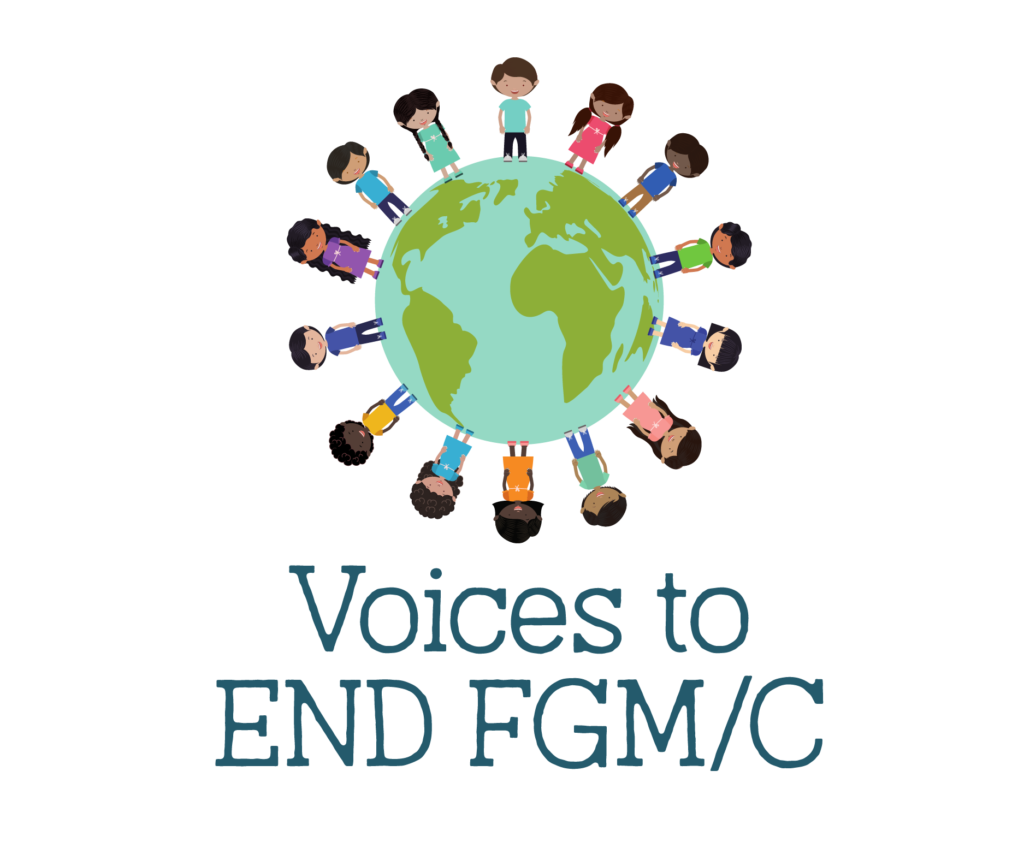
We are thrilled to announce the launch of the Voices to End FGM/C Screening Guide, an educational resource developed by Sahiyo, Silence Speaks, and the Asian Women’s Shelter. This guide marks a significant step forward in our collective efforts to amplify the voices of survivors, educate people, and mobilize communities to support ending female genital mutilation/cutting (FGM/C). Supported by the Wallace Global Fund and the Office for Victims of Crime, U.S. Department of Justice, the guide is designed to help everybody facilitate impactful screenings of digital stories by survivors, activists, and advocates. These stories are not just narratives; they are powerful testimonies of resilience, courage, and the human spirit’s ability to overcome. Why This Guide Matters FGM/C is a social norm justified by a variety of reasons, yet it carries significant implications for women’s health, rights, and well-being. The Voices to End FGM/C Screening Guide stands as a crucial step forward in our collective efforts to raise awareness, foster understanding, and drive change. The guide offers a wealth of tools and templates to assist in organizing screenings of Voices to End FGM/C videos, whether within organizations, schools, or informal gatherings. It aims to create a space for learning, reflection, and action, encouraging participants to move from awareness to advocacy. By hosting a screening, you contribute to a larger dialogue about human rights, gender equality, and the urgent need to end FGM/C. What You’ll Find Inside The guide serves as a comprehensive toolkit for anyone committed to ending FGM/C, providing the following information: Detailed screening guidelines Discussion prompts Event planning tools Resources for organizing engaging and informative screenings A selection of digital stories from our Voices project We encourage you to visit our Voices to End FGM/C website and browse through the diverse narratives from around the globe. Join the Movement By exploring the Voices to End FGM/C Screening Guide, you’re taking a significant step towards raising awareness and creating opportunities for dialogue. We hope this guide becomes more than just a resource; we want this guide to serve as a call to action for everyone who believes in the power of storytelling to inspire change. We invite you to join us in this vital movement. For any questions or to learn more about our Voices program, please reach out to us ataries@sahiyo.org. Related: Voices to End FGM/C 2023 Cohort Video Screening
Voices to End FGM/C 2023 Cohort Video Screening

On Wednesday, March 27th at 10 AM PT/1 PM ET, Sahiyo will host a screening of the newest Voices to End FGM/C videos, which were developed through Sahiyo, Asian Women’s Shelter, and Silence Speaks, with survivors of and advocates against female genital mutilation/cutting (FGM/C). In addition to viewing these nine poignant stories, attendees will get the chance to hear from some of the storytellers themselves about their work and journey. “I hope that my story will be a clarion call for folks to help me bring to light the need for medical care for hundreds of thousands of women who need help locally, nationally, and globally.” Doris Mukangu, Voices ‘23 Workshop Participant Date: March 27th Time: 10 AM PT/1 PM ET Registration link: https://bit.ly/Voices23Screening The Voices to End FGM/C Program is a digital storytelling project created by Silence Speaks and Sahiyo that aims to mobilize a critical mass of survivors and activists from across the globe. Voices to END FGM/C brings people together to share and heal from their experiences of FGM/C, to connect and grow as leaders in their own communities, and to create short videos calling for an end to this harmful practice. If you are interested in hosting a screening ofVoices to End FGM/C videos with your own organization, with classmates, or with coworkers, we are excited to announce the release of our Voices to End FGM/C Screening Guide. This is an in-depth resource with discussion questions, FAQs about FGM/C, and event planning templates. For any questions, related to this guide or our Voices program, please email aries@sahiyo.org
Apply for our Voices to End FGM/C 2024 Hybrid Digital Storytelling Workshop!
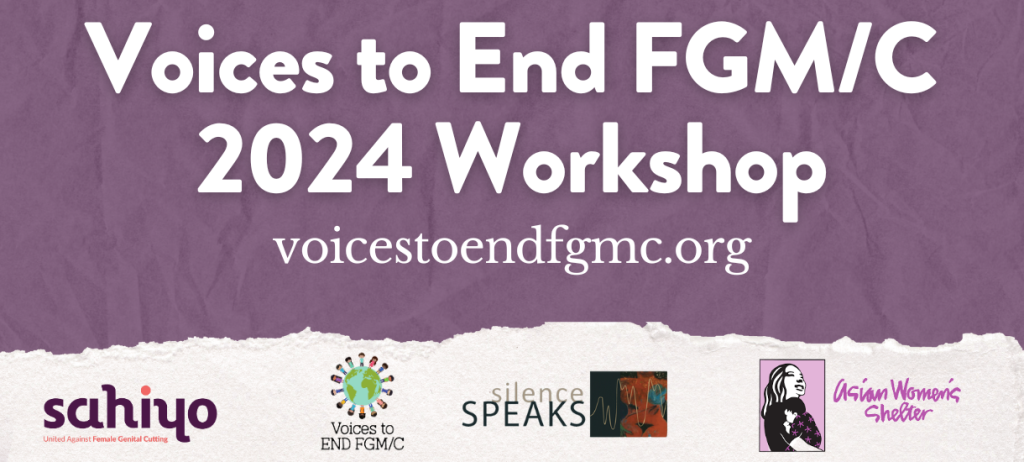
We are planning our second hybrid-format Voices to End FGM/C Digital Storytelling Workshop! This workshop offers a global platform for FGM/C survivors and community members affected by it to share their stories. When: Online Workshop Dates: May 28 and June 4, 4-6 pm PT / 7-9 pm ET In-person Workshop Dates: June 22-23 in Washington, D.C. 9 am – 5 pm ET (travel days: June 21 and 24, 2024) Who: Open to individuals in the U.S. impacted by FGM/C as well as allies passionate about raising awareness and ending the practice. What: Learn to craft impactful videos using techniques and mediums like voice-overs, images, and short clips guided by facilitators from Sahiyo, SilenceSpeaks, and Asian Women’s Shelter. Post-Workshop: Sahiyo will assist participants in sharing their videos publicly as part of our advocacy efforts to raise awareness. Apply by April 15, 2024 to be part of the ninth Voices to End FGM/C cohort!For inquiries, contact Aries at aries@sahiyo.org. You can also visit our website to learn more about the project and watch past workshop videos!
Zero Tolerance Day 2024: Her Voice, Her Future

On February 13th, the World Bank invited Sahiyo to host a screening of the Voices to End FGM/C Digital Storytelling Project in honor of International Day of Zero Tolerance for Female Genital Mutilation/Cutting. During the virtual event, attendees from around the world watched nine videos from Voices to End FGM/C collection including videos from U.S. Executive Director Mariya Taher, and alumni Severina Lemachokoti and Renee Bergstrom. Afterward, all three discussed the healing nature of sharing one’s story, the challenges that come from speaking up, and the overall advocacy that is done to end FGM/C. To watch Severina’s digital story, click here. To watch Renee’s digital story, click here.
Voices to End FGM/C 2023 Cohort Video Screening

Date: March 27th Time: 10 AM PT/1 PM ET Registration link: https://bit.ly/Voices23Screening On Wednesday, March 27th at 10 AM PT/1 PM ET, Sahiyo will host a screening of the newest Voices to End FGM/C videos, which were developed through Sahiyo, Asian Women’s Shelter, and SilenceSpeaks, with survivors of and advocates against female genital mutilation/cutting (FGM/C). In addition to viewing these nine poignant stories, attendees will get the chance to hear from some of the storytellers themselves about their work and journey. “I hope that my story will be a clarion call for folks to help me bring to light the need for medical care for hundreds of thousands of women who need help locally, nationally, and globally.” Doris Mukangu, Voices ‘23 Workshop Participant The Voices to End FGM/C Program is a digital storytelling project created by SilenceSpeaks and Sahiyo that aims to mobilize a critical mass of survivors and activists from across the globe. Voices to END FGM/C brings people together to share and heal from their experiences of FGM/C, to connect and grow as leaders in their own communities, and to create short videos calling for an end to this harmful practice. With the support of the Wallace Global Fund and the Office for Victims of Crime, U.S. Department of Justice, Sahiyo is currently designing a guide to equip you with the necessary tools to host meaningful educational screenings using videos from the Voices program. In the guide there are discussion prompts, FGM/C FAQ sheets, and event planning tools aimed at fostering deep engagement and inspiring action. For any questions, related to this upcoming guide or our Voices program, please email aries@sahiyo.org
Voices to End FGM/C Cohort #9 – Hybrid Digital Storytelling Workshop
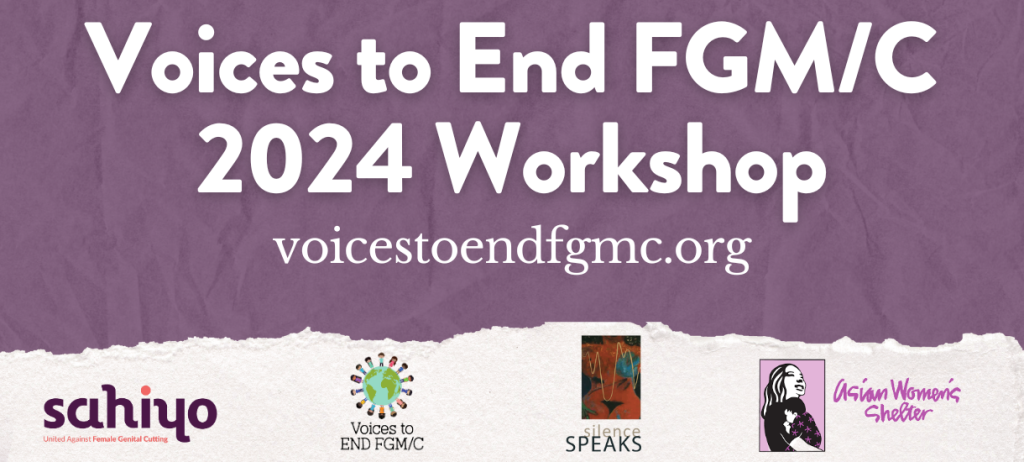
We’re hosting our second hybrid-format Voices to End FGM/C Digital Storytelling Workshop this June 2024! Survivors and advocates will share their stories and learn to craft them as short videos. This participatory media process will be guided by facilitators from Sahiyo, Silence Speaks, and Asian Women’s Shelter. Online Workshop Dates: Tuesday May 28 and Tuesday June 4 (via Zoom). In-person Workshop Dates: Saturday and Sunday June 22 and 23. In-person Workshop Location: Washington, DC. Who Can Apply: Individuals living in the U.S. who have experienced FGM/C, as well as family members, friends, advocates, and others living in the U.S. who would like to share a story about the impact of FGM/C in their lives. Note: we are not able to accommodate overseas applicants in this session. Apply online today! Application Deadline: April 15, 2024. TRAVEL SCHOLARSHIPS ARE AVAILABLE for those in need of financial support to attend the workshop! To learn more about the Voices workshop experience, watch our behind the scenes videos.
Sahiyo to release nine new Voices to End FGM/C digital stories
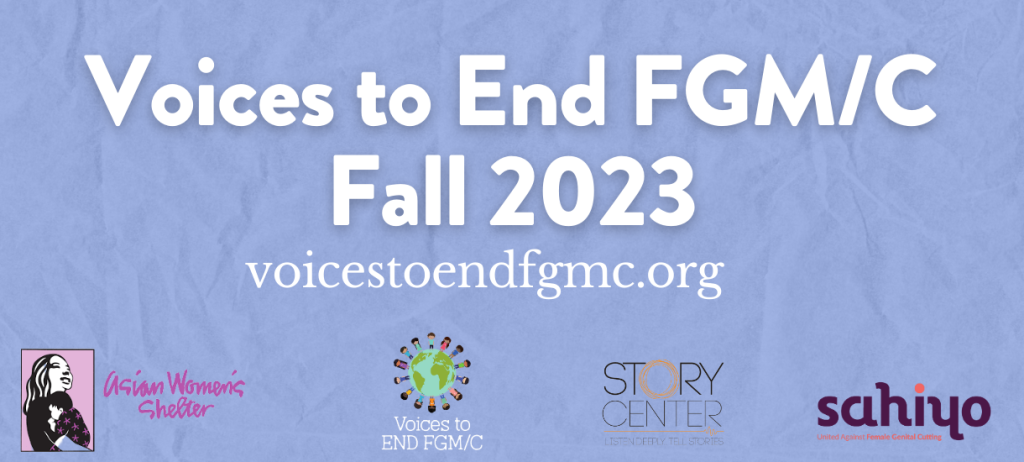
“Everything I learned from the workshop was gold to me. I enjoyed all the sessions and the new skills I acquired in creating a digital story (…) about a scar. A scar that my primary duty bearers believed was necessary to have in order to be labeled as the “purified” girl, for marriage, as opposed to being referred to as a “solimaa”, the uncut girl. A scar that will resemble a fresh wound for the rest of my life. Here I am today, after being silent for many years. I now am not afraid to talk in public about stopping FGM/C.I wish I didn’t have this scar. I wish you didn’t either. But we don’t have to be silent about it.” ~Amie Kujabi, Voices Storyteller Amie is one of nine storytellers who participated in the latest cohort of the Voices to End FGM/C project. Each participant bravely created videos sharing their experiences with female genital mutilation/cutting (FGM/C), with the ultimate goal of ending this harmful practice. And starting on January 17th, Sahiyo will begin sharing these short videos along with reflection blogs from each storyteller. A collaboration between Sahiyo, StoryCenter, and Asian Women’s Shelter (AWS), every year the Voices to End FGM/C project brings together survivors, activists, and others impacted by FGM/C from around the world. Together, these storytellers heal by connecting and sharing their stories, while growing as leaders. So far, we’ve held seven workshops in the past six years, supporting over 70 courageous souls from more than 19 countries to share their experiences. Along with being therapeutic, these stories are tools we use to plant the seeds of greater social change. Through watching these videos, we’ve educated governments about the need for policies that protect future generations of girls from FGM/C. The videos also teach healthcare professionals and other service providers about the impact of this practice, so they can better help survivors. “I just hope people that receive this message understand how wrong this is and if there’s anyone who’s in my shoes who’s lost a friend this way or someone they loved, that way they can get up and advocate and they can start speaking against this practice. I hope when they receive this message, they realize the danger.” ~Gugu Makhari, Voices Storyteller We’ll be updating the blog with the videos and reflection blogs from this year’s cohort when they’re available very soon. In the meantime, you can support storytellers from past cohorts by watching their videos on this playlist. For further questions, contact Aries at aries@sahiyo.org.
Musuya (Womanhood)
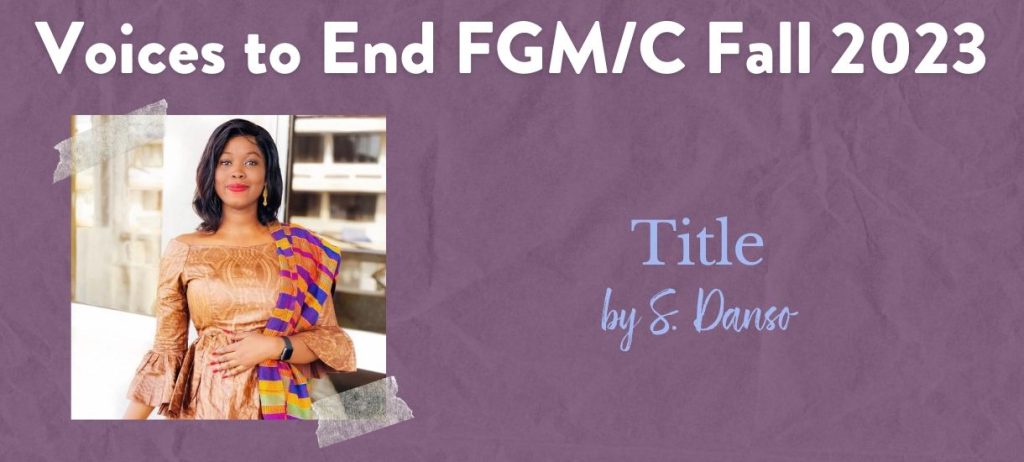
“I believe they don’t really know what it is and how it is conducted, the procedures, and the negative impact that it has… It will be easy to say ‘don’t ban FGM’ when you don’t know what happened in there.” In S Danso’s country, men are working in Parliament to repeal the ban on female genital mutilation (FGM). However, S feels that her story of undergoing FGM and its impact will make those who wish to perform FGM on their loved ones reconsider. She felt it was important to be a part of the growing number of voices raised against FGM, and the Voices to End FGM/C digital storytelling workshop provided an opportunity to do so on an international level. When asked why she wanted to attend the workshop and share her story of FGM, S’s answer was clear: raising awareness. She chose to tell the story of her experience undergoing the cut, with exact details of the ceremony and circumcision that are not well known. “If you are educating people, it is important to get right to the point.” The Voices to End FGM/C workshop was also impactful to S in multiple ways, as she learned from the other participants, who came from different parts of the world. In particular, other survivors talked about how to deal with the “post-FGM whatsoever.” “Things happen and you don’t know how to deal with it,” S explains of her experience as a survivor. However, people at the workshop “explained their healing process” as well as “how to do advocacy work and better convey [a] message to the people.” “Hearing their stories… has motivated me to come up and give out my story. I feel so empowered and confident hearing all of their stories.” S’s workshop experience represents that there is power in numbers, and in creating safe spaces where survivors can come together to share, to heal, and to advocate for change. [youtube url=”https://www.youtube.com/watch?v=iTN6j2JINnE”] S Danso is a Gambian National and a legal practitioner with over eight years of experience in community work and activism focusing on equality, inclusion and social justice. Currently, she is the secretary-general of One African Women’s Forum, an international organization that focuses on promoting women’s rights based in Nigeria. Sirra has impressed all with her warmth, wisdom, and kindness, but above all, her intellectual curiosity and a keen interest in social justice and equality remain exceptional.
It’s a Marathon, Not a Race
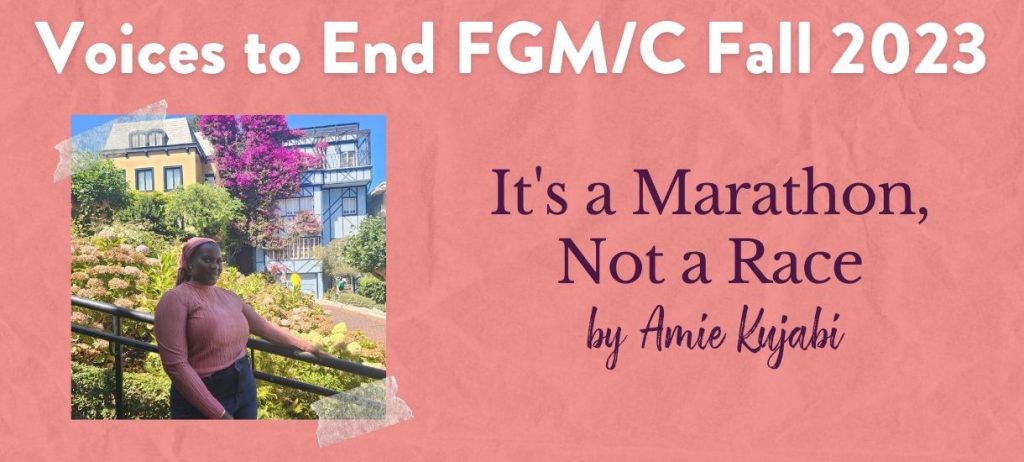
By Amie Kujabi I am an FGM/C survivor. For the past two decades, my advocacy on FGM/C has been centered around other survivors and girls at risk—but never have I shared my story. A story that shaped the trajectory of my childhood and marked the beginning of a long…long…lonely self-awareness journey to an unknown destination. I took a bold step and shared my story as an FGM/C survivor with people outside of my close-knit circle by giving testimony during an anti-FGM/C bill hearing with policymakers in Washington State. It occurred to me that there is a need for survivors to share their unique stories to raise awareness and encourage action-oriented commitments from different stakeholders. When the opportunity to participate in the digital storytelling workshop presented itself, I challenged myself to be part of the amplified voices. Voices that not only narrate similar stories about FGM/C but also give a human face to FGM/C. In our digital world, people are moved not just by words, but also by actions and visual representation. Since FGM/C is not seldom talked about—a taboo in our communities—it was important for my story to be told in a captivating way, to change the narrative. My digital story narrates the experiences I remember the most as a six-year-old girl who was taken to another country (Senegal) for FGM/C, under the disguise of spending summer break with my cousins and family. And so it happened: I was cut and introduced into “womanhood,” as they claimed. I later understood it as “vocational cutting” at the peak of my self-awareness journey as an adult and advocate. My story highlights the issues I faced—and I continue to struggle with. As a survivor, I struggled a lot, with my relationships growing up and in adulthood. Though this experience took me on an unknown journey, it landed me on the shores of “fighting for what is right”. That’s what propelled me into my work as a girl’s and women’s rights advocate. Everything I learned from the workshop was gold to me. I enjoyed all the sessions and the new skills I acquired in creating a digital story. From learning how to write a straight-to-the-point short story, creating and editing a digital story, being in a space with other survivors and allies, sharing our stories, and most importantly, finding support in each other. It made me feel seen and understood in my multifaceted emotions and struggles that the rest of the world may never see on a day-to-day basis. The workshop was an amazing experience, and I want more women (and others ) to be part of this great network. Together we can create more digital stories that amplify voices against this horrendous practice. I want my story to captivate the attention of people from different walks of life. I hope that it will inspire survivors to share their stories, allies to render their support when and where it is needed, and even those on the other side of the table to finally resist this age-old tradition that harms girls. My hope is to see every state and nation have solid anti-FGM/C policies in place. I know for a fact that these laws concentrate on protecting girls at risk of being subjected to FGM/C, but I hope to see the implementation of policies that would support survivors of FGM/C as well. I hope you will find the time to watch my short digital story. A story about a scar. A scar that my primary duty bearers believed was necessary to have in order to be labeled as the “purified” girl, for marriage, as opposed to being referred to as a “solimaa”, the uncut girl. A scar that will resemble a fresh wound for the rest of my life. Here I am today, after being silent for many years. I now am not afraid to talk in public about stopping FGM/C. If there had been laws when I was a child, things would have been different. I was able to convince another family member to have her girls cut. And my mother is finally on board with me. But all I can think is that I failed you. I wish I didn’t have this scar. I wish you didn’t either. But we don’t have to be silent about it. [youtube url=”https://www.youtube.com/watch?v=Kfp7DQXzjlk”] Amie Kujabi was born and raised in The Gambia, a small country in West Africa. She is very passionate about development issues, especially from a grassroots level, but also, about what development should entail at a global scale. Amie is a human rights advocate, as well as a champion for women and girls’ rights and empowerment. She is also the co-founder of Think Young Women, a young women-led organization in The Gambia. Amie is an FGM/C survivor and anti-FGM/C advocate currently residing in Washington State. As a member of the Washington Coalition to End FGM/C, Amie helped Washington become the 41st state to enact anti-FGM/C legislation. Amie is also a recent graduate of Global Development Studies and French and Francophone Studies and aspires to contribute immensely to the development of her community, state, and at the international level.
Turning Grief into Purpose
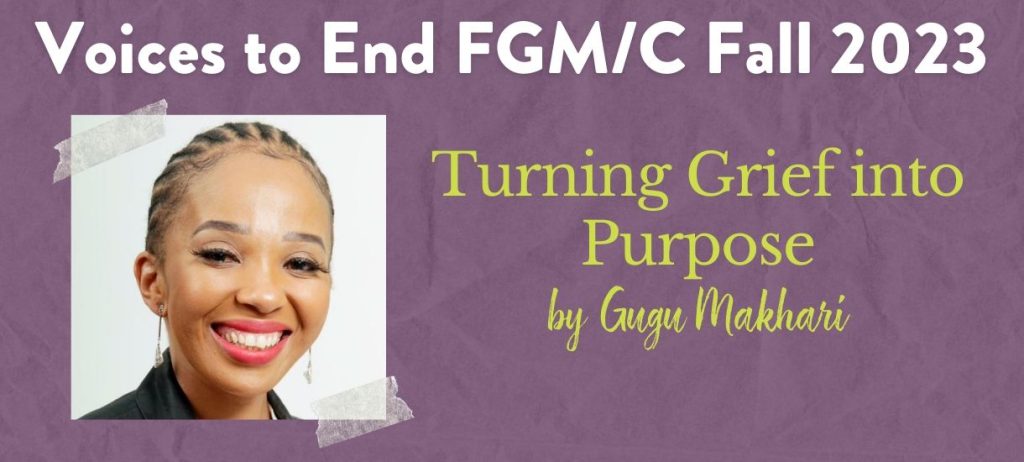
Gugu Makhari learned about the Voices to End FGM/C digital storytelling project through a friend and through personal research online. She wanted to share a story about how both female genital cutting (FGC) and male circumcision are normalized in her community. Those who undergo these harmful practices are often celebrated after they are cut. “After a couple of months they come back and then we have this big ceremony where everyone comes out from different neighborhoods all together and they will go in a group and sing along cheer for them, so we’re so used to that.” But, this tradition had a painful impact on Gugu. She knew one girl who underwent FGC and never spoke to her again; and another friend who underwent male circumcision and died from the practice. These experiences affected her for life, and she still feels the loss of her close friend for the sake of tradition. “I lost a friend and I always wanted to express myself… but I didn’t know how and I didn’t really have a platform to do that.” The Voices workshop allowed her to have the space to tell her story for the first time. Gugu described her friend who died as: “The only person I had at the time when I was going through a lot at home, that understood me and who was really supportive and really loved me genuinely. He was very close to me. So yeah, that hurts.” Learning about her friend’s death was difficult for Gugu, as their relationship was something she cherished deeply. “When I found out about his death. I went to his home and his mom [told] me what happened, but she didn’t tell me in detail. I was still a little young, in our culture…you accept what you are told and that’s usually it. I’m not gonna be asking his mom why you let this happen.” The unknown circumstances of her friend’s death frustrated Gugu, not knowing what happened, and why a practice with fatal consequences occurred in her community. This is what inspired her to create a story in his memory. For her digital story, Gugu created art pieces that reflected the fun and joy that radiated from her friend. “I was expressing myself using the art… it helps in so many ways. It was… a kind of healing, I don’t know how to say it. But it also helped because it opened another door for me to really now use art as a form of expression for human rights. The art was about the culture where he came from. I have some drums that I drew in different sizes so that it resembles being heard amplifying your voice louder and louder and louder” The Voices workshop provided her a cathartic space to tell her story, and to learn the stories of others who had undergone harmful practices like FGC. “I’ve learned a lot about being confident and I learned a lot about sharing your story, how it can change other people’s lives. I’ve been to so many workshops and events, but I didn’t even feel like I was necessarily at a workshop. It felt like I was with family. And I couldn’t believe that people have gone through so much pain. Hearing other people’s stories made me realize that there’s more for us to fight for in the world. And even if I was not directly affected, it helped for me to be there as well as a voice.” Gugu’s choice to share her story about her friend highlights how connections can be made between the movement to end FGC and other harmful practices justified by tradition. “I just hope people that receive this message understand how wrong this is and if there’s anyone who’s in my shoes who’s lost a friend this way or someone they loved, that way they can get up and advocate and they can start speaking against this practice. I hope when they receive this message, they realize the danger.” [youtube url=”https://www.youtube.com/watch?v=YlO7asmsWxA”] Gugulethu ‘Gugu’ Makhari is a dynamic force dedicated to championing women’s rights, human rights, and youth empowerment on a global scale. As the Chair of the Commission on Women’s Rights and Human Rights, she serves as a passionate advocate for change through her active involvement with the Youth Council for Global Sustainable Development Goals Inc NGO. Her commitment to creating a better world extends beyond borders, as she has also taken up the role of USA National Organizer and Coordinator for the “March For Our Planet” movement, catalyzing action for environmental sustainability. Gugu’s multifaceted expertise and unwavering dedication make her an inspiring force driving positive change in diverse spheres.
